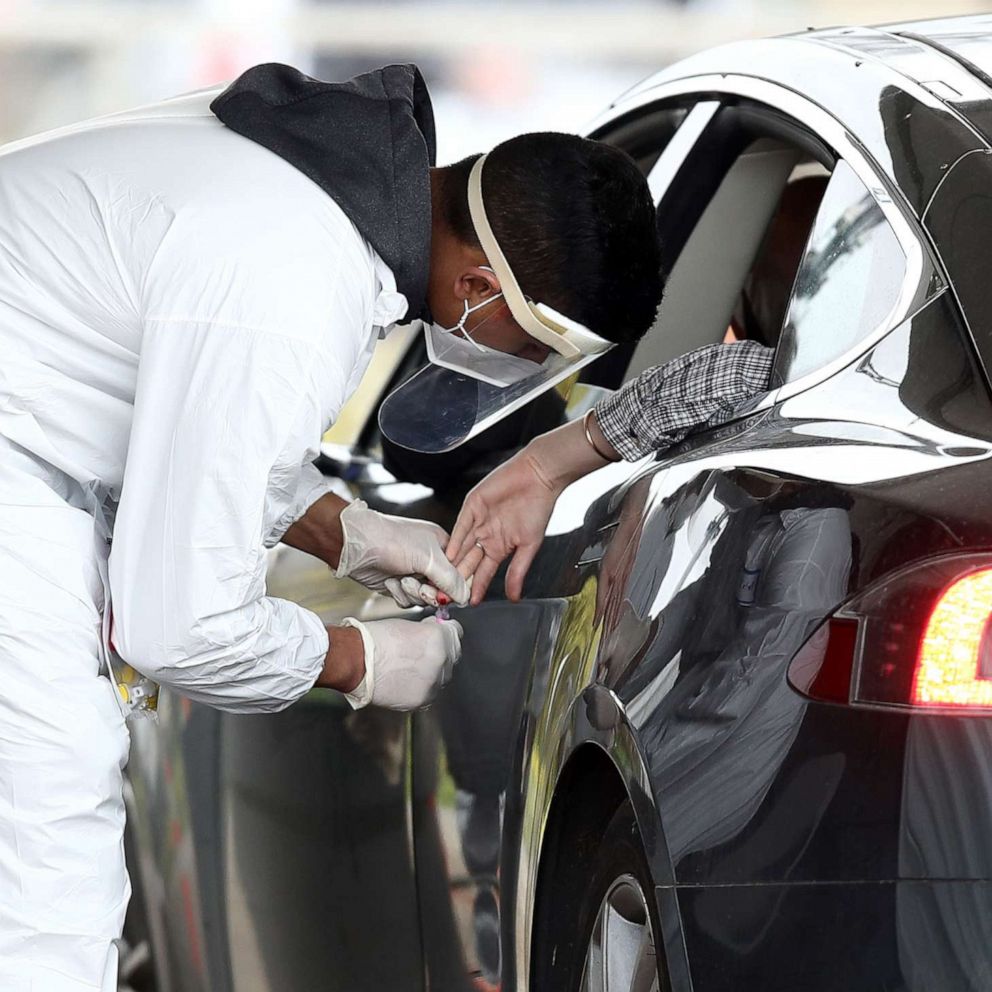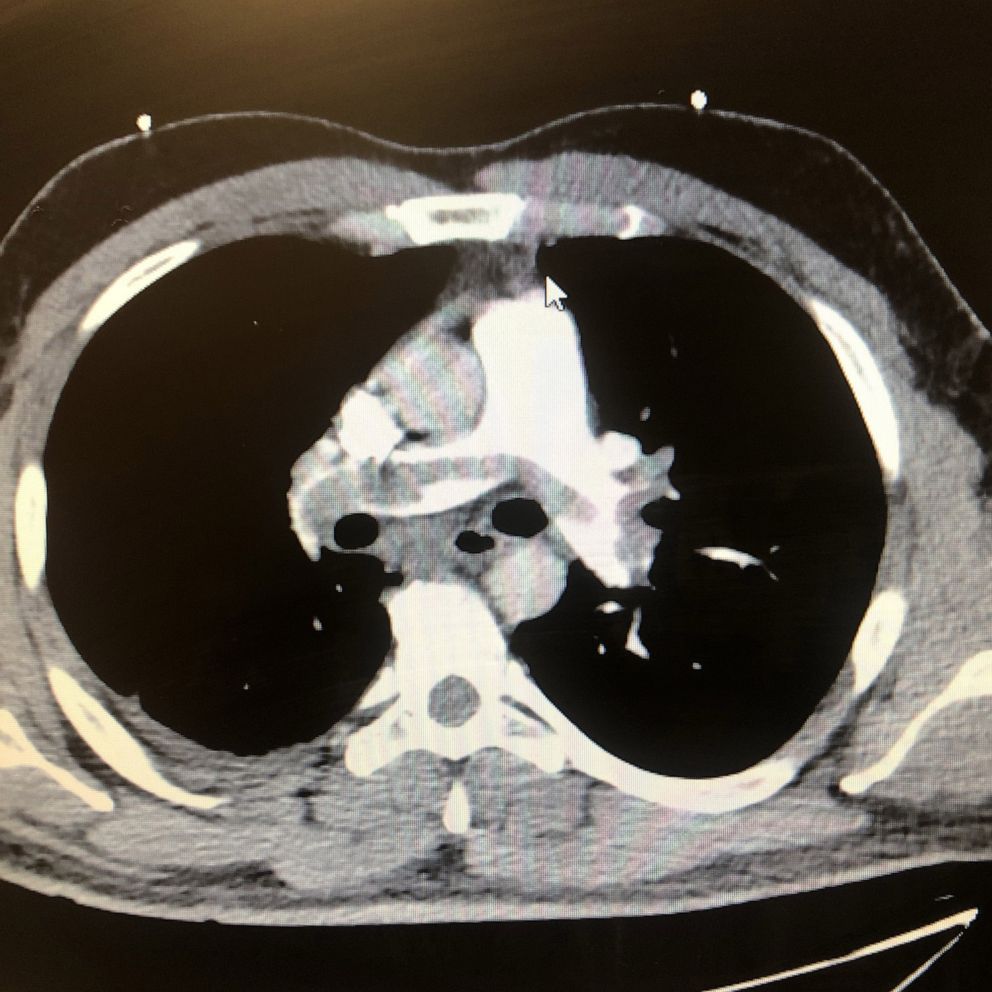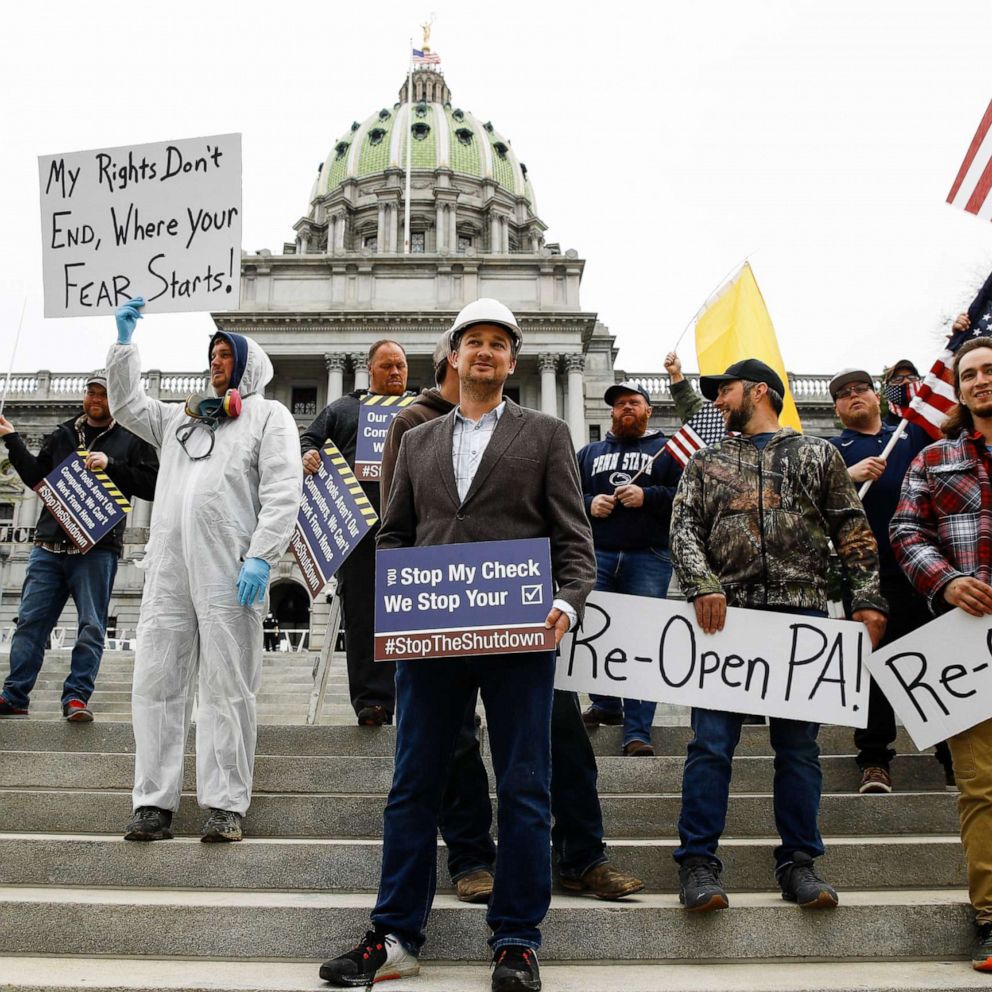Pandemic could cause famines of 'biblical proportions'
"An additional 130 million people could be pushed to the brink of starvation."
A global pandemic of the novel coronavirus has now killed more than 176,000 people worldwide.
Over 2.5 million people across the globe have been diagnosed with COVID-19, the disease caused by the new respiratory virus, according to data compiled by the Center for Systems Science and Engineering at Johns Hopkins University. The actual numbers are believed to be much higher due to testing shortages, many unreported cases and suspicions that some governments are hiding the scope of their nations' outbreaks.
Since the first cases were detected in China in December, the United States has become the worst-affected nation, with more than 823,000 diagnosed cases and at least 44,805 deaths.
Tuesday's biggest developments:
Here's how the news developed Tuesday. All times Eastern.
7:31 p.m.: Quest Diagnostics to start COVID-19 antibody testing
Quest Diagnostics will begin testing blood samples for COVID-19 antibodies, the commercial laboratory company announced Tuesday.
Antibody tests can indicate who has been exposed to novel coronavirus and recovered, which is considered a crucial step in reopening the economy.
Quest is using two tests that can detect the presence of antibodies by 14 days after symptoms start. It has completed independent validation studies on both tests, the company said.
Depending on demand, Quest expects to have test results within one to two days of collecting the blood sample.
The company plans to expand its laboratory capacity from 70,000 tests per day by the end of this week to 150,000 tests a day by early May at more than 20 laboratories nationwide.
The company, which also processes COVID-19 tests, serves about half of the physicians and hospitals in the U.S., according to its CEO Steve Rusckowski.
6:48 p.m.: Trump to suspend US immigration for 60 days
President Donald Trump expounded on his decision to suspend immigration to the U.S., saying it would last 60 days during the White House’s daily press briefing Tuesday.
Any extension will be "based on economic conditions at the time," he added.
It will apply to those seeking legal permanent residency, or green cards, and not those entering the U.S. on a temporary basis, the president said.
"We want to protect our U.S. workers," Trump said at the briefing. "This pause on new immigration will also help to conserve vital medical resources for American citizens."
In a late-night tweet announcing the plan on Monday, the president said he would carry out the directive through an executive order.
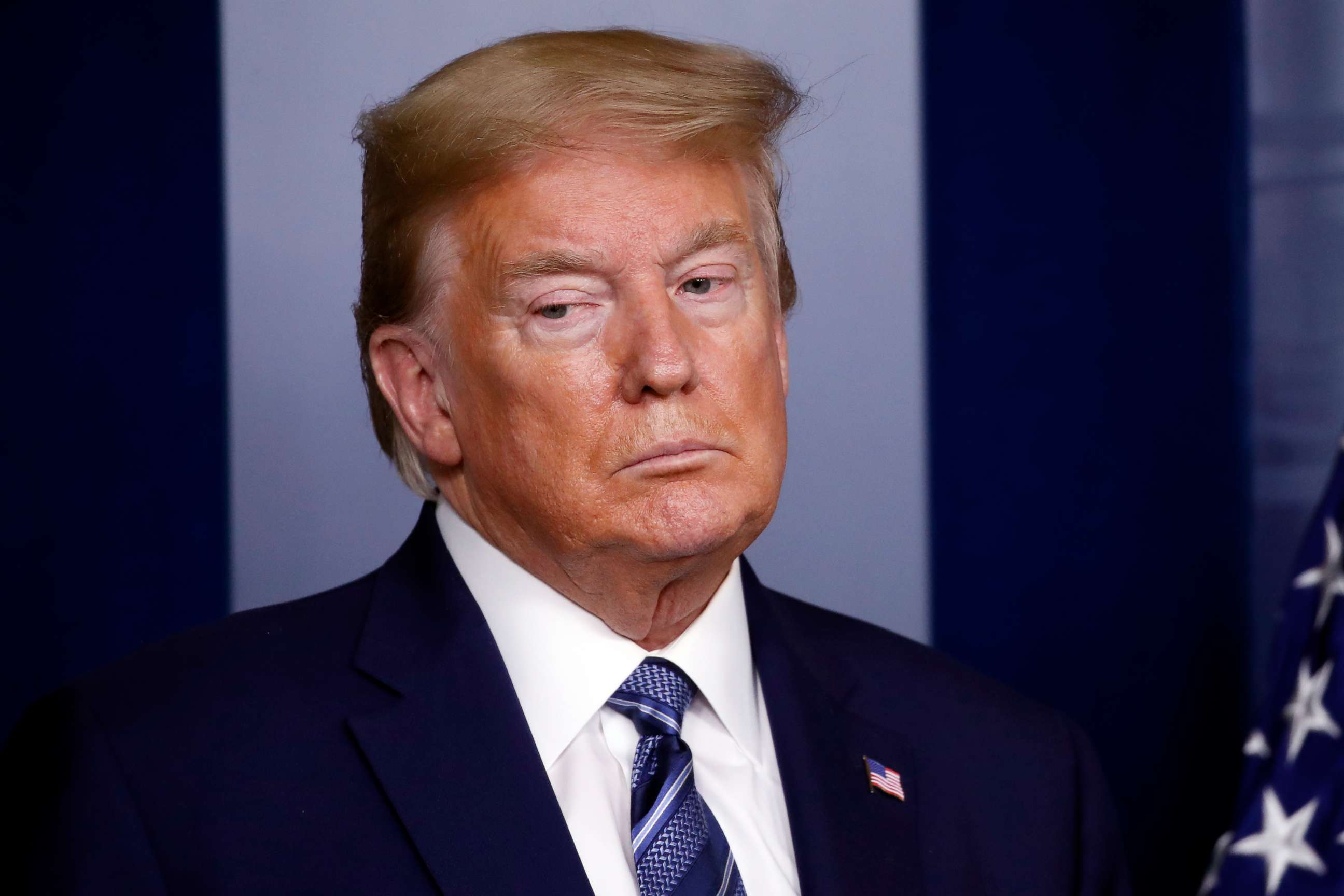
5:50 p.m.: Senate passes $484B coronavirus relief package
The Senate unanimously approved a $484 billion deal Tuesday afternoon that includes funds for small businesses, hospitals and testing.
The agreement will add another $310 billion to the Paycheck Protection Program, a small business loan program that ran out of money last week.
The deal also adds $75 billion to hospitals, $60 billion to the Small Business Administration’s disaster relief fund and $25 billion to COVID-19 testing.
The House is expected to vote on the package on Thursday.
President Donald Trump pushed for passage of the deal on Twitter, saying, "I urge the Senate and House to pass the Paycheck Protection Program and Health Care Enhancement Act with additional funding for PPP, Hospitals, and Testing."
4:50 p.m.: Pandemic could cause famines of 'biblical proportions'
The coronavirus pandemic could soon double hunger, causing famines of "biblical proportions" around the world by the end of the year, the head of the World Food Programme, David Beasley, told the U.N. Security Council on Tuesday.
Beasley warned that analysis from the World Food Programme, the U.N.'s food-assistance branch, shows that because of the coronavirus, "an additional 130 million people could be pushed to the brink of starvation by the end of 2020. That’s a total of 265 million people."
He said there are no famines yet, but warned, "If we don’t prepare and act now -- to secure access, avoid funding shortfalls and disruptions to trade -- we could be facing multiple famines of biblical proportions within a short few months."
Beasley said in "a worst-case scenario," famine could strike about three dozen countries. He noted that in 10 of those countries, at least 1 million people are already on the verge of starvation due to other conditions, like conflict.
Tune into ABC at 1 p.m. ET and ABC News Live at 4 p.m. ET every weekday for special coverage of the novel coronavirus with the full ABC News team, including the latest news, context and analysis.
4:40 p.m.: Cuomo says he had 'productive' meeting with Trump
New York Gov. Andrew Cuomo told MSNBC he thinks his meeting with President Donald Trump at the White House Tuesday was "productive," following a war of words between the two leaders.
"This is not about anyone's emotions," Cuomo told MSNBC, describing the tone of the conversation at "very functional and effective."
Cuomo said he wanted a face-to-face conversation with Trump to talk about his main concern: testing.
"We need help from the federal government to make the supply chain work," Cuomo told MSNBC.
"I also spoke to the president about the need for the states to get funding," Cuomo added.
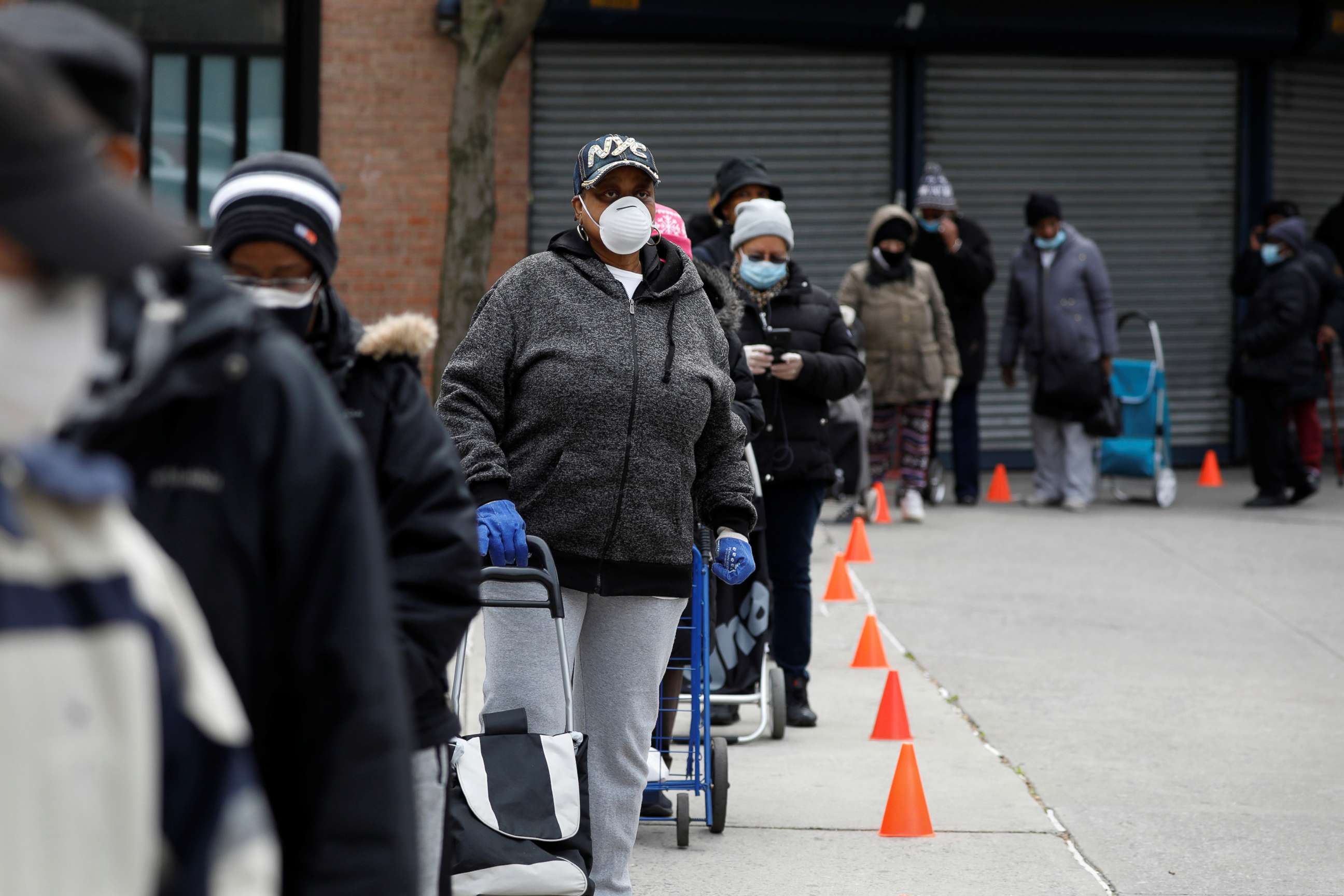
3:30 p.m.: NJ governor refuses to 'rush' reopening schools
In New Jersey, the coronavirus death toll has reached 4,753, Gov. Phil Murphy said Tuesday.
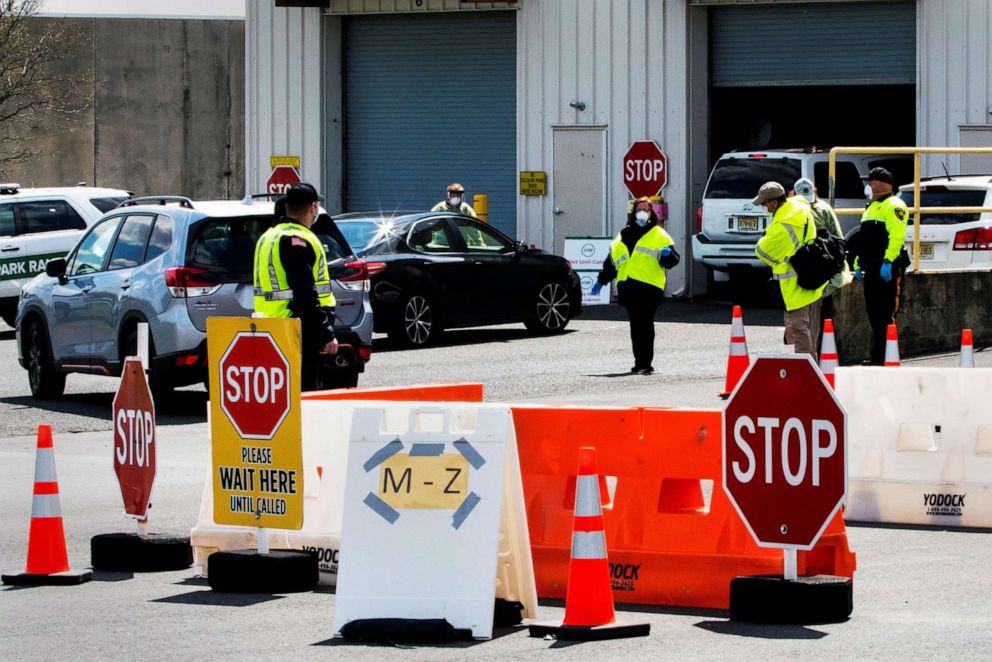
While over 92,000 people have been diagnosed, the state is seeing decreases in the number of new hospitalizations, Murphy said.
"For now, we have to do things like keeping our parks closed," the governor said, adding they can't risk undoing the good that has been done so far.
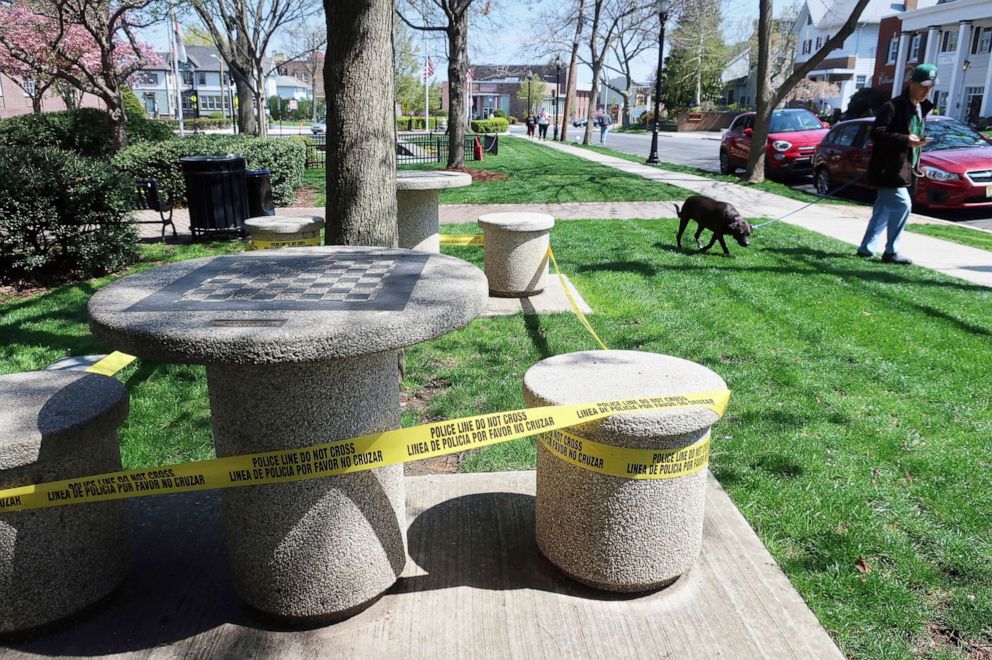
"That's why our schools are still closed and will be," he continued. "We are not going to open our schools back up until we are convinced by the science and medical professionals that doing so would be safe for students, for staff."
When schools reopen, Murphy said "we will not hesitate to require additional protections, things like face coverings, or certain configurations of classrooms, if we believe by doing so we will make our schools even safer."
"I understand the concern felt by so many parents what their kids are missing by having the schools closed," Murphy said. "We just can't rush this."
2:40 p.m.: Officials in hard-hit Albany, Georgia, upset over governor lifting restrictions
Officials in hard-hit Albany, Georgia, are concerned after Gov. Brian Kemp said Monday he's lifting some of the state’s restrictions on businesses, including hair and nail salons, starting this Friday.
Albany Mayor Bo Dorough said Tuesday that the lifting of restrictions should be gradual.
"Social distancing cannot be maintained in a barber shop, in a beauty shop or in a nail salon," Dorough said.
"The governor, in addition to receding the shelter in place order, essentially precluding your local officials from taking action to protect the citizens of this community," the mayor said. "A community where 15 funerals were held just last weekend."
"I pray that the number of Georgians who are infected and die will not increase significantly in the coming weeks as a result of the lifting of these restrictions," Dorough said.
1:20 p.m.: Massachusetts schools will stay closed through end of school year
With Massachusetts in the midst of a rise in coronavirus cases, Gov. Charlie Baker announced Tuesday that schools will stay closed through the end of the school year.
"We know that the lack of child care for many families has created an unanticipated burden and it’s hard to look after young children and balance the demands of working at home, but maintaining this structure is the best way to keep our kids and our providers safe from the spread of this insidious disease," he explained.
"There were a lot of mixed feelings in the education community on whether or not to go back. But we have got to do this right, and we have got to respect the virus," Baker added.
Massachusetts' death toll has climbed to 1,566. Over 39,000 people had been diagnosed as of Monday.
"The data shows we are still very much in the grip of the pandemic," Baker said.
12:45 p.m.: UK to start vaccine trial
The United Kingdom will begin trials of a vaccine developed at Oxford on Thursday, U.K. Health Secretary Matt Hancock said on Tuesday.
If it works it will be made available to the British people as soon as possible, he said.
The U.K.'s death toll has reached 17,337, according to the Department of Health and Social Care.
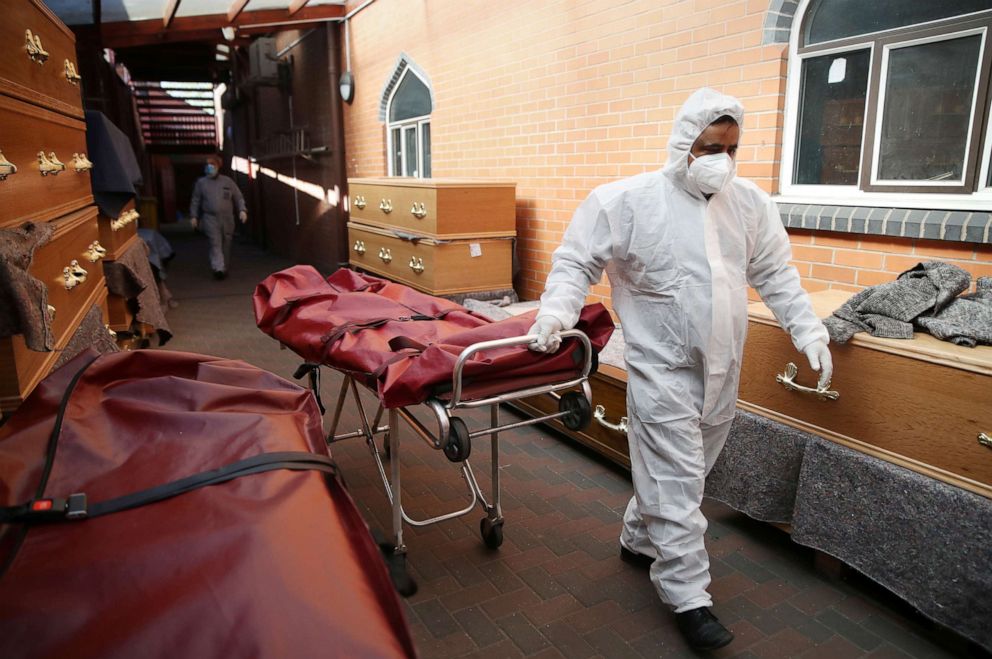
The U.K. has the fifth highest death toll, behind the U.S., Italy, Spain and France.
Over 129,000 people in the U.K. have been diagnosed with the coronavirus, including Prime Minister Boris Johnson, who was released from the hospital after receiving treatment.
12:38 p.m.: 4th TSA employee dies from COVID-19
A fourth TSA employee has died from COVID-19.
Victor Chung, a Miami International Airport supervisory TSA officer, worked for the agency for over 17 years. He died on Sunday, the TSA said.
"Victor was known to his colleagues as a compassionate leader, always willing to support officers in need, whether financially or by donating his leave to others who were in need," TSA officials said in a statement.
As of Tuesday morning, 459 TSA employees have tested positive for COVID-19, the agency said. Of those,110 have recovered and 4 have died.
12:15 p.m.: Spain to ease restrictions for children
Beginning April 27, Spain will ease some lockdown restrictions for children under the age of 14, Spanish government spokesperson Maria Jesus Montero said.
Children will be allowed to accompany a parent who is leaving the house for a specific, essential task. But it will be the responsibility of the adult to ensure that children follow social distancing guidelines and avoid playground and parks where close contact may not be avoided.
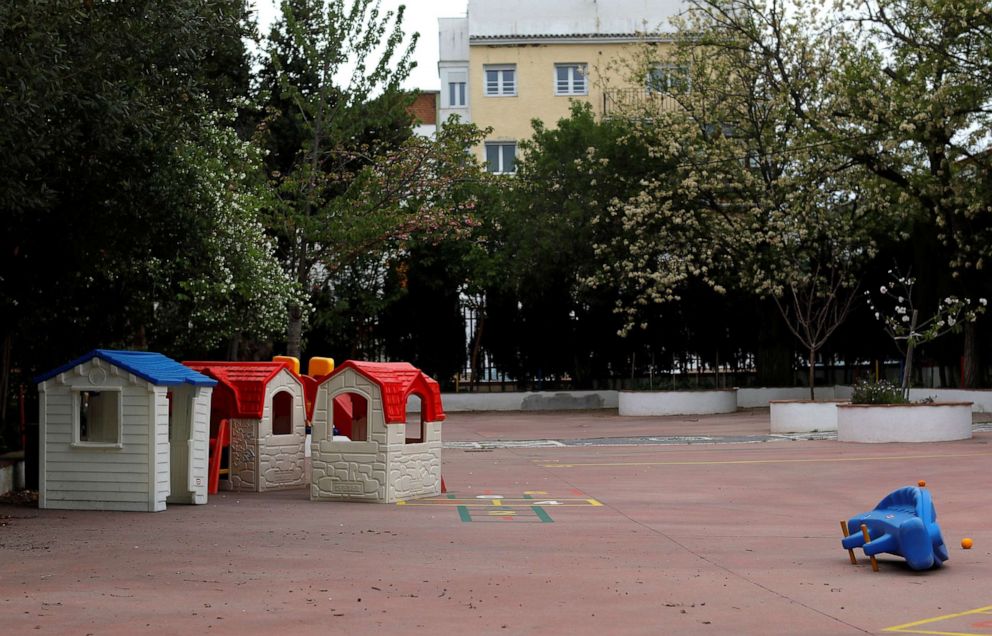
Spain's death toll has climbed to 21,282. Over 204,000 people have been diagnosed.
Spain's state of emergency, which was implemented on March 14, has been extended to May 9.
11:20 a.m.: NYC 'seeing definite progress'
In New York state, 481 people succumbed to the coronavirus on Monday, including 29 people in nursing homes, Gov. Andrew Cuomo said Tuesday.
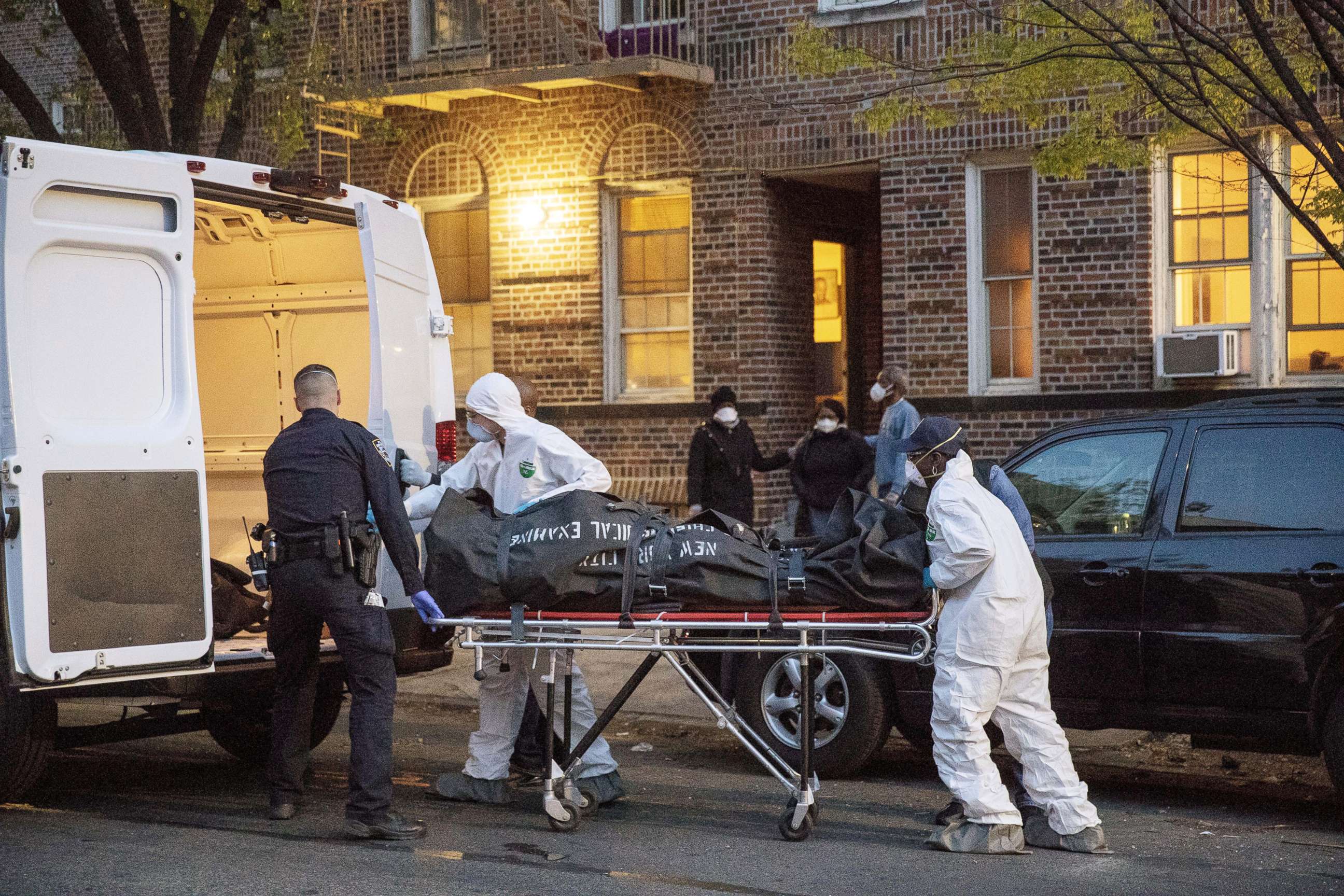
Cuomo, who banned elective procedures when the pandemic struck, announced Tuesday that he will now allow elective outpatient treatment in counties and hospitals without significant risk of a surge in the near future.
Cuomo said testing will be the focus of his conversation with President Donald Trump later on Tuesday at the White House. Cuomo said there isn't enough material for the test kits and he needs federal help.
New York City -- the U.S. epicenter of the pandemic -- is "seeing definite progress" overall, Mayor Bill de Blasio said Tuesday.
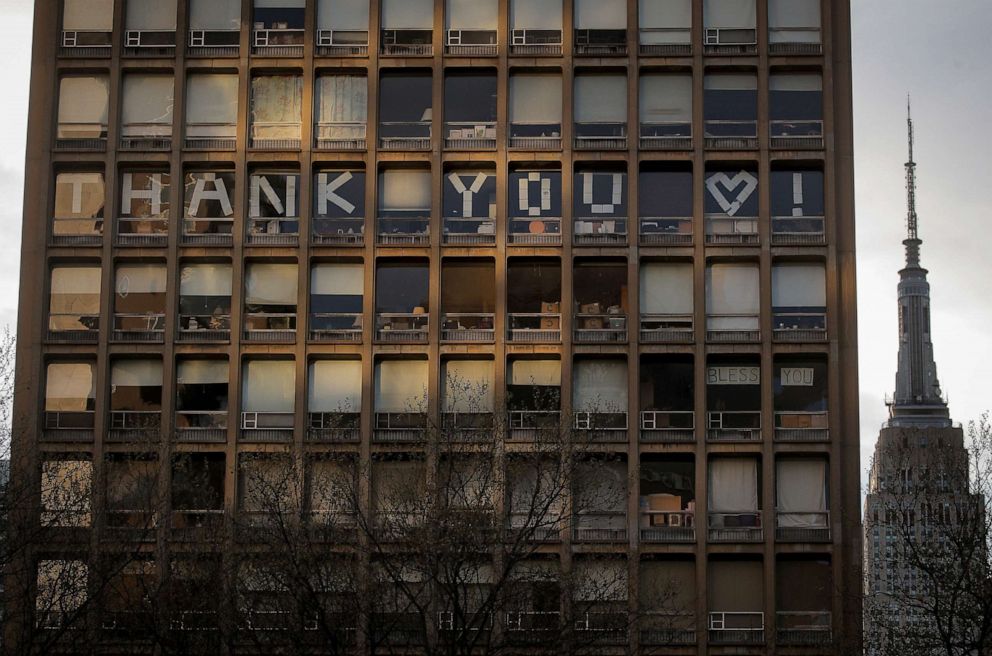
On Sunday, 204 people were admitted to hospitals for suspected COVID-19 -- down from 212 on Saturday.
Additionally, 857 patients were in intensive care units on Sunday, only slightly up from 853 patients on Saturday.
Thirty-five percent of the people tested citywide were positive Sunday. On Saturday, 34% of those tested were positive.
"Let's keep with it," de Blasio said. "It'll take some time, but we can do it."
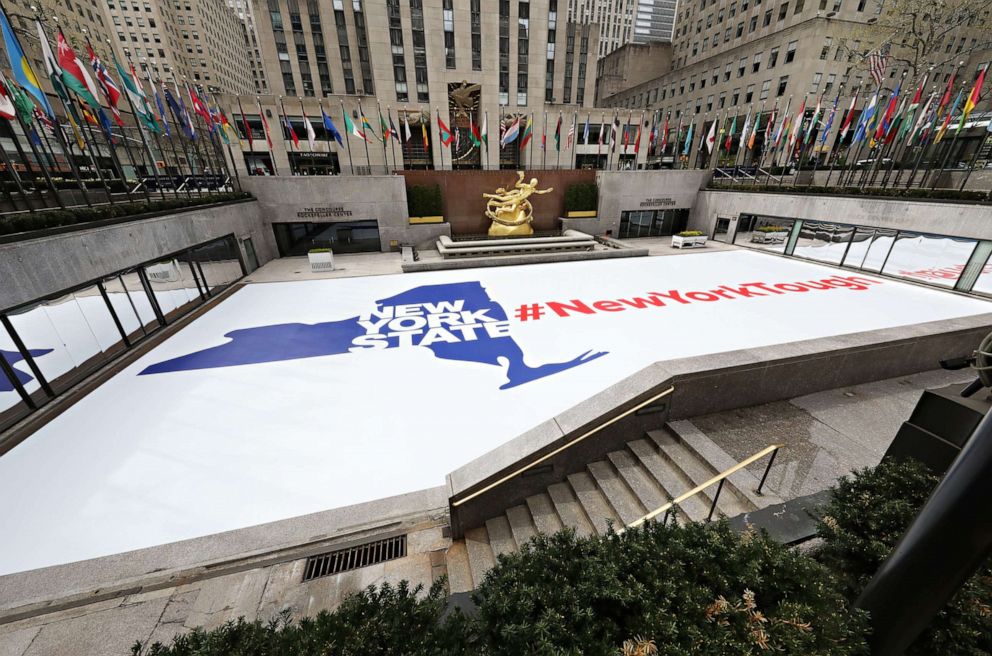
De Blasio announced Tuesday that New York City is starting its own strategic reserve program to hold vital medical equipment and supplies for any future wave of the pandemic, without having to rely on the federal government. The reserve will include face shields, surgical gowns, test kits and bridge ventilators.
Once the social distancing restrictions have been lifted, the city will throw the "biggest and best" parade to honor and thank the "heroes" of the pandemic and mark "the beginning of our renaissance," the mayor said.
On Monday, de Blasio announced all parades and other nonessential permitted events for June were canceled. Among the annual June events in New York is the LGBTQ Pride March, which would have been celebrating its the 50th anniversary this year.
No decision has been made on 4th of July celebrations in New York City.
11 a.m.: Nashville mayor says he won't extend the April 30 stay-at-home order
Nashville Mayor John Cooper won't extend the current stay-at-home order past April 30, he told ABC News anchor Amy Robach on Tuesday.
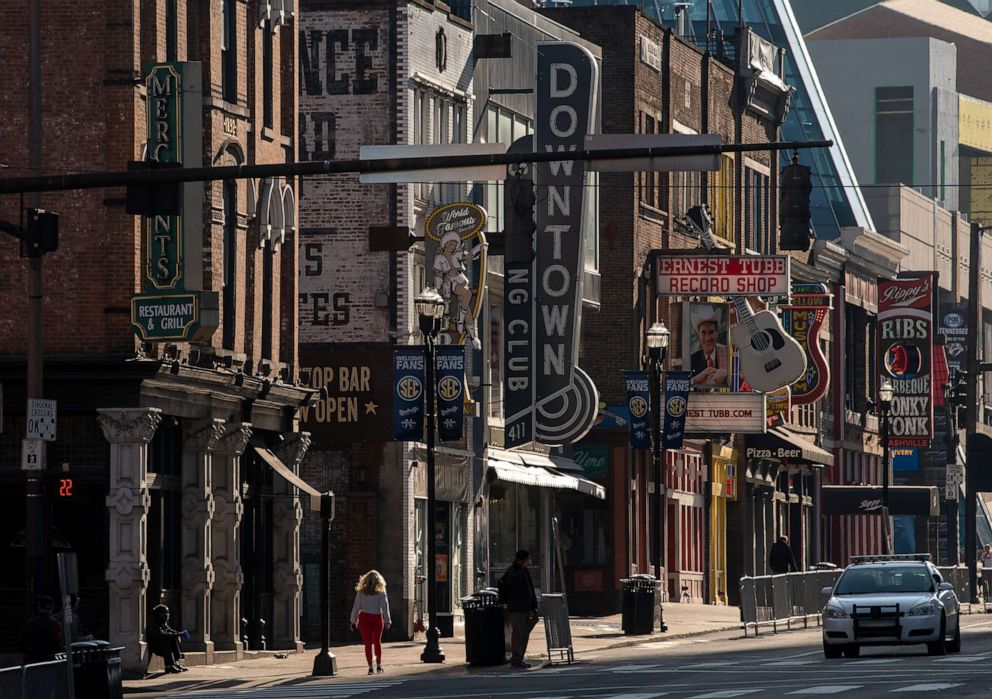
Davidson County, which includes Nashville, has 1,936 confirmed cases as of Tuesday morning.
The mayor mandated a stay-at-home order early on in the pandemic, even before the state's governor issued one.
Tennessee Gov. Bill Lee announced Monday that the "vast majority" of businesses in 89 of the state's 95 counties can reopen on May 1. The governor said his administration will work with the remaining six counties -- which includes Nashville -- "as they plan their own reopen strategies."
Cooper said he hopes that reopening the lively city will increase consumer confidence.
"We’re excited to get restarted," he told ABC News. "We're with COVID for a long time. We’re going to have to learn how to live with it ... let’s get back to work."
To the protesters rallying around Nashville, Cooper said, "It’s their right to protest and it's our right to keep people safe."
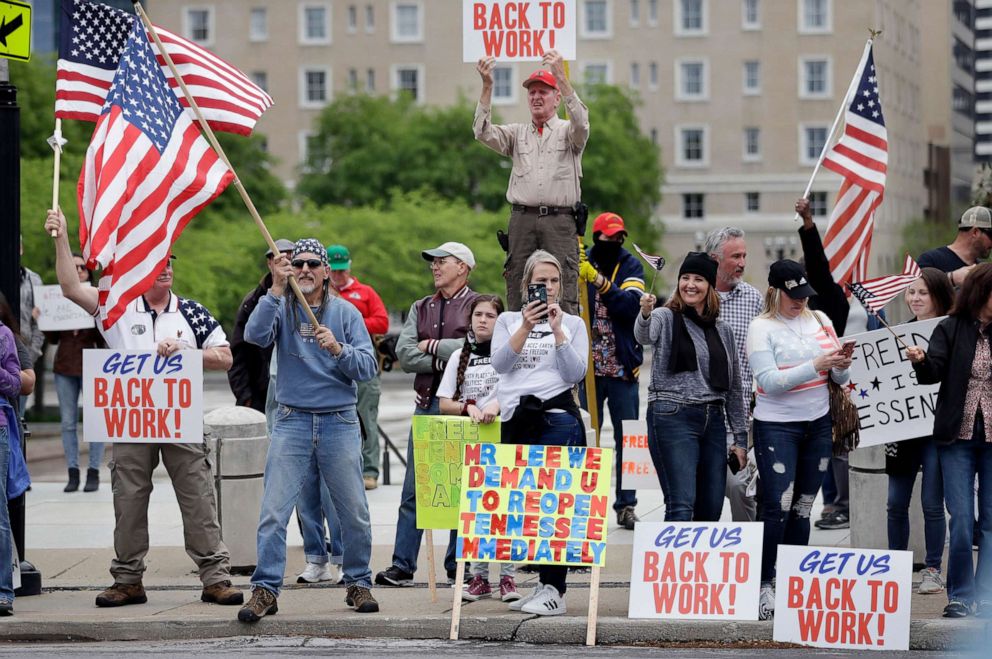
"I hope you’re social distancing appropriately," he cautioned.
9:50 a.m.: Dozens of Mumbai-based journalists test positive for COVID-19
More than 50 journalists have contracted the novel coronavirus in Mumbai, India.
The Brihanmumbai Municipal Corporation, the governing civic body of Mumbai, tested 171 journalists working in the field and reporting on the health crisis in the city, and at least 53 tested positive for COVID-19. Most of the infected journalists -- cameramen, photographers and reporters -- don't show any symptoms, according to the Mumbai Press Club.
All those who tested positive are now in quarantine and being looked after by local health authorities.
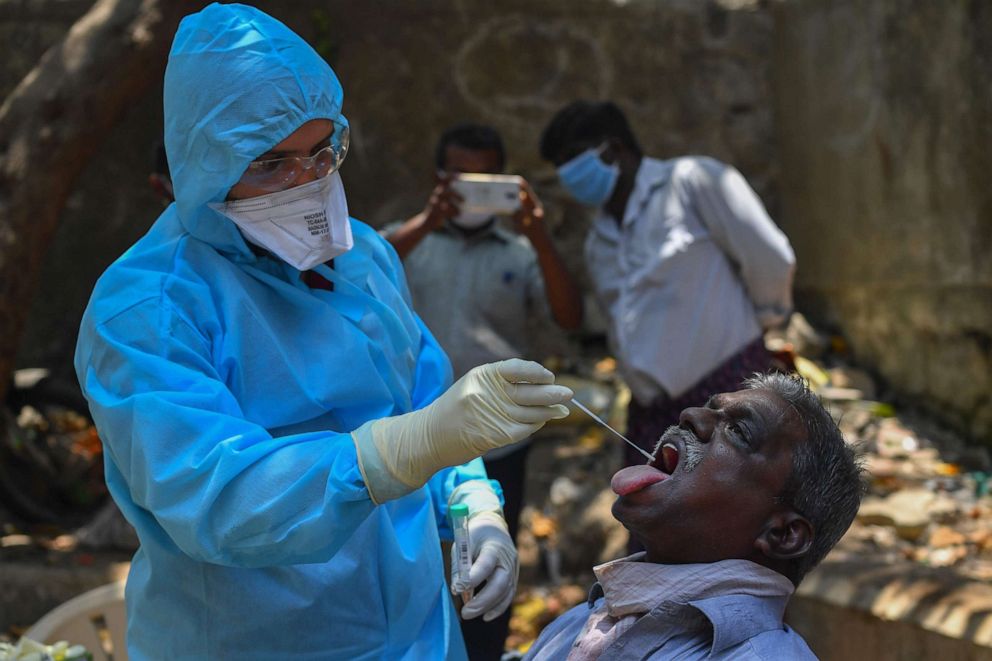
The Mumbai Press Club has called on Maharashtra state's chief minister, Uddhav Thackeray, to take "immediate steps to safeguard our lives and profession."
"It must be pointed out that as Mumbai City locked down to face the challenge of the coronavirus, these field journalists even today continue to stand by their duty, filing their reports, taking photographs and recording videos in the most hazardous locations," the Mumbai Press Club wrote in an open letter Monday. "Most media houses have shut their offices and have not provided any protective gear, or special insurance to these frontline personnel. However, they continue to demand reports and visuals and expect the journalists to move around the city risking life and limb."
Indian Minister of Information and Broadcasting Prakash Javadekar said his ministry would issue an advisory to all media organizations to ensure precautions are being taken.
"It is shocking that more than 50 journalists of electronic media, particularly camera persons, have been found corona positive in Mumbai," Javadekar tweeted Monday. "Every journalist should take proper care."
There are nearly 19,000 diagnosed cases of COVID-19 in India, and at least 603 people there have died, according to a count kept by Johns Hopkins University. The bulk of the country's cases have been recorded in Maharashtra state, of which Mumbai is the capital.
9:25 a.m.: FDA authorizes 1st at-home COVID-19 test kit
The U.S. Food and Drug Administration on Tuesday authorized the first diagnostic test with a home collection option for COVID-19.
The federal agency reissued the emergency-use authorization for LabCorp's molecular test to permit testing of samples collected by patients at home using a designated self-collection kit that contains nasal swabs and saline.
"Throughout this pandemic we have been facilitating test development to ensure patients access to accurate diagnostics, which includes supporting the development of reliable and accurate at-home sample collection options," FDA Commissioner Stephen Hahn said in a statement Tuesday. "With this action, there is now a convenient and reliable option for patient sample collection from the comfort and safety of their home."
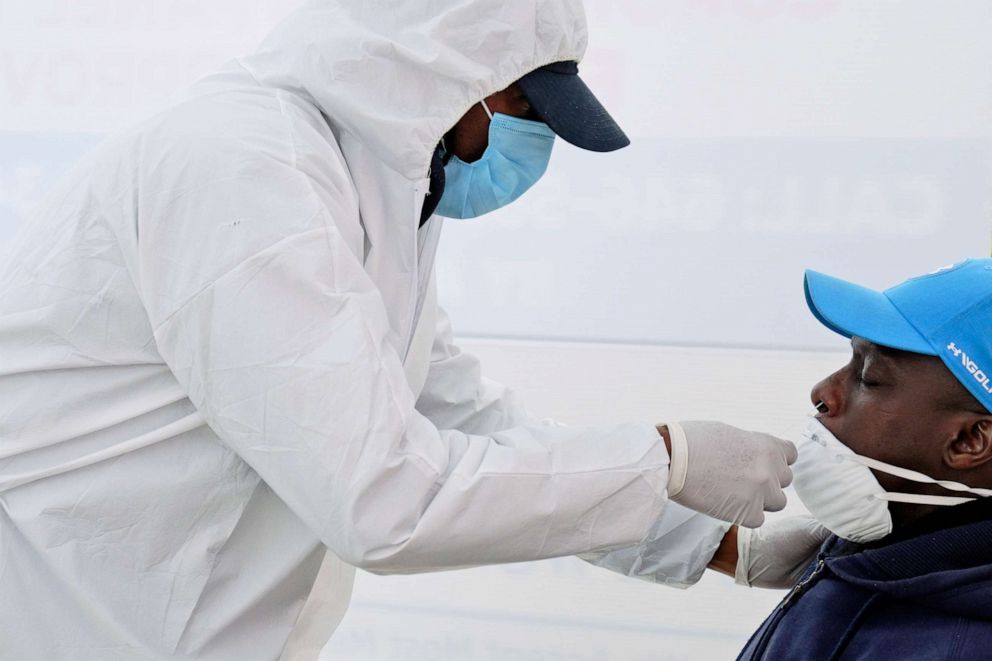
After a patient uses the self-collection kit to swab their own nose, they mail their sample in an insulated package to a LabCorp lab for testing. The North Carolina-based company intends to make its Pixel by LabCorp COVID-19 Test home collection kit available to consumers in most U.S. states -- with a doctor's order -- in the coming weeks, according to a press release from the FDA.
"The FDA's around-the-clock work since this outbreak began has resulted in the authorization of more than 50 diagnostic tests and engagement with over 350 test developers," Hahn said. "Specifically, for tests that include home sample collection, we worked with LabCorp to ensure the data demonstrated from at-home patient sample collection is as safe and accurate as sample collection at a doctor's office, hospital or other testing site."
9:04 a.m.: Spain cancels running of the bulls festival due to pandemic
Spain's iconic running of the bulls festival has been canceled this year due to the coronavirus pandemic.
The San Fermin festival takes place every year in the northern town of Pamplona between July 6 and 14. But the town's acting-mayor, Ana Elizalde, announced Tuesday that the event could not be held this year because of the health crisis.
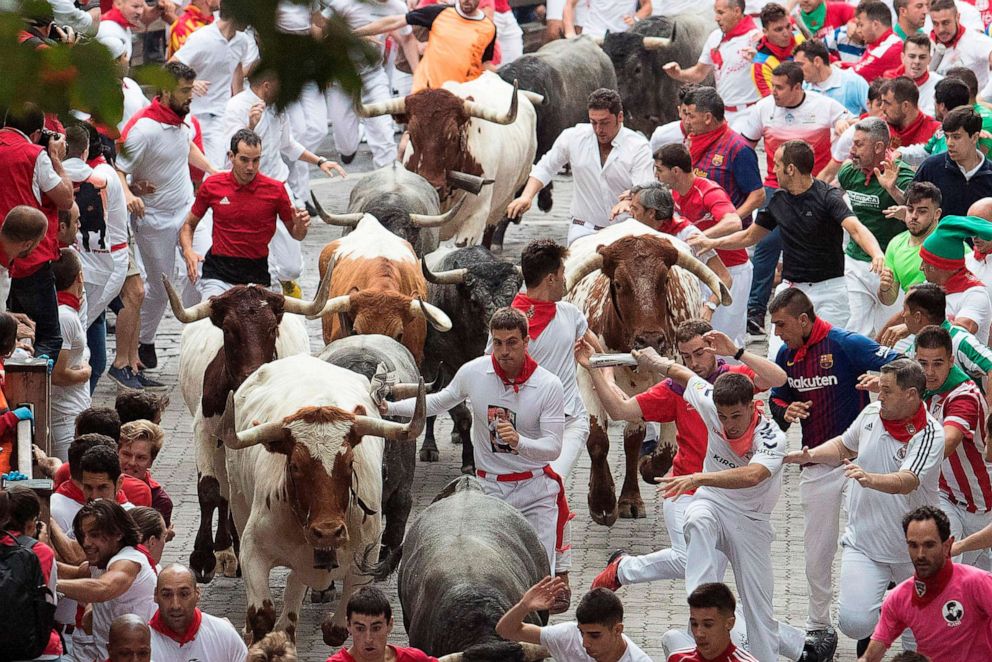
Spain is one of the world's worst-affected countries in the ongoing pandemic, with more than 204,000 diagnosed cases of COVID-19 and over 21,000 deaths.
7:30 a.m.: WFP warns pandemic could double number of people facing food crisis
The worldwide number of people suffering acute hunger could almost double by the end of the year due to the crippling economic impact of the coronavirus pandemic, the United Nations' World Food Program warned Tuesday.
Unless swift action is taken, that figure stands to rise to 265 million in 2020, up from 135 million in 2019, according to a WFP projection, which was announced alongside the release of the Global Report on Food Crises.
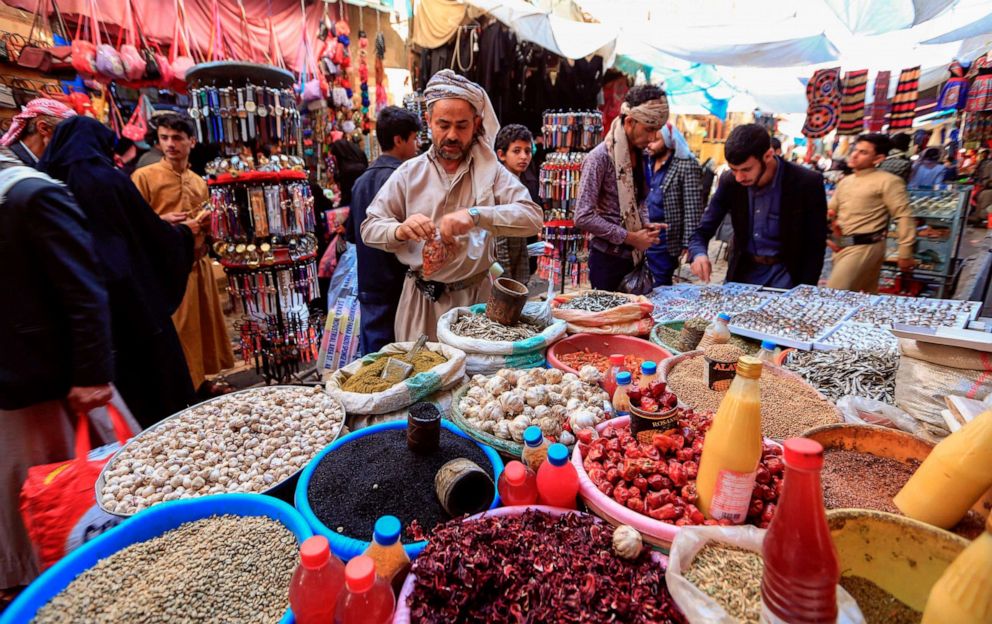
"COVID-19 is potentially catastrophic for millions who are already hanging by a thread," WFP's senior economist, Arif Husain, said in a statement on Tuesday, "It is a hammer blow for millions more who can only eat if they earn a wage. Lockdowns and global economic recession have already decimated their nest eggs."
"It only takes one more shock -- like COVID-19 -- to push them over the edge," he added. "We must collectively act now to mitigate the impact of this global catastrophe."
5:59 a.m.: Russia surpasses 50,000 cases
Russia on Tuesday morning reported 5,642 new cases of the novel coronavirus, bringing the national tally to 52,763, according to the country's coronavirus response headquarters.
Another 51 people died from COVID-19 overnight, bringing Russia's death toll to 456.
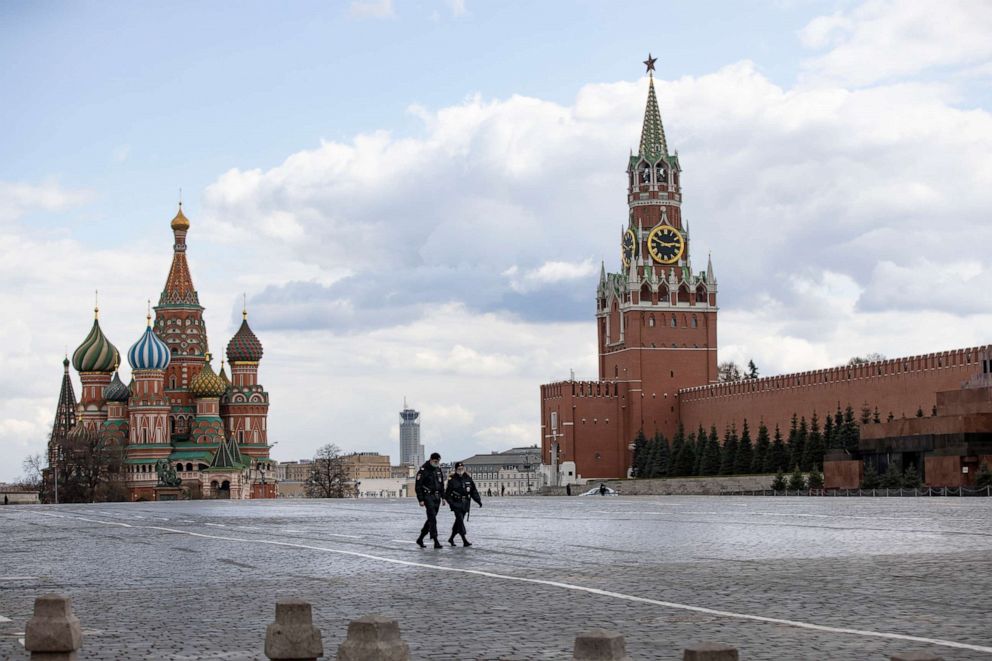
Moscow still has the bulk of the country's infections, with 3,083 new cases registered in the city over the past 24 hours.
Authorities in Moscow and other areas have ordered most residents -- except those working in essential sectors -- to stay home through April 30. Residents are only allowed to leave their homes to shop at nearby grocery stores and pharmacies, walk their dogs and take out trash.
What to know about coronavirus:
- How it started and how to protect yourself: Coronavirus explained
- What to do if you have symptoms: Coronavirus symptoms
- Tracking the spread in the U.S. and worldwide: Coronavirus map
5:19 a.m.: Italy can start reopening next month, prime minister says
Italian Prime Minister Giuseppe Conte announced Tuesday that the hard-hit country can start reopening on May 4, but he said a total loosening of the lockdown measures "would be irresponsible."
In a Facebook post, Conte explained that Italy was preparing to move into "phase two" of its response plan, the details of which will be announced by the end of next week. Officials will also take into account the situation in each region.
"It is too easy to say, 'let's open everything,'" Conte said.
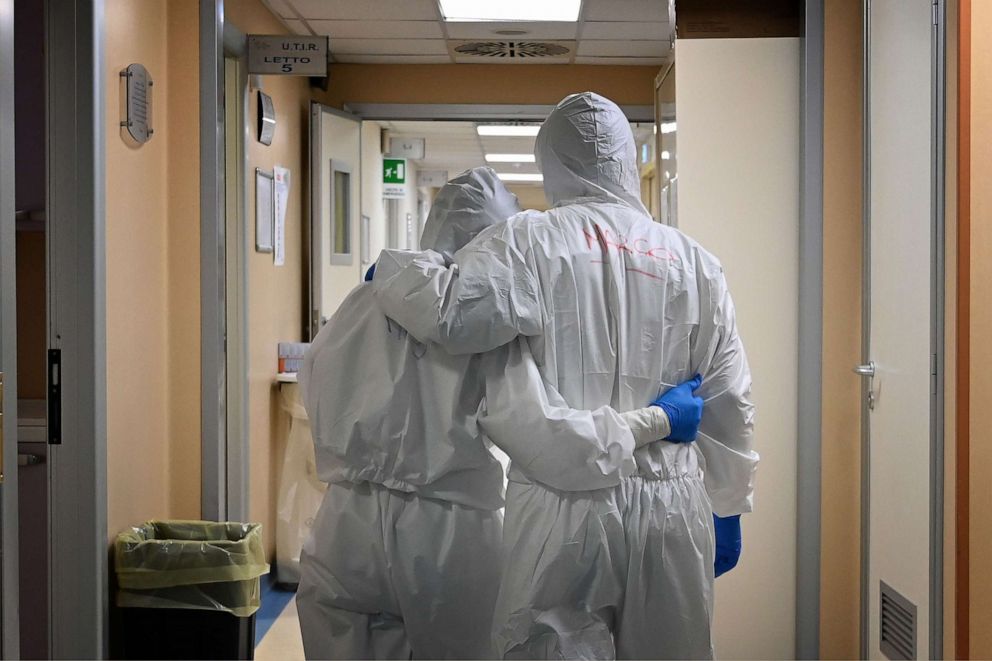
Italy is one of the world's worst-affected countries in the coronavirus pandemic, with more than 181,000 diagnosed cases of COVID-19 and over 24,000 deaths, according to a count kept by Johns Hopkins University. The country became the first in Europe to impose a coronavirus-related nationwide lockdown, which has been in place since March 10.
On Monday, Italy recorded its first drop in the number of people currently sick with the virus since the country reported its first case in February.
4:46 a.m.: Germany cancels Oktoberfest 2020 due to pandemic
Germany's iconic Oktoberfest, the world's largest beer festival, has been canceled this year due to the coronavirus pandemic.
Every year, around 6 million people flock to the festival grounds in Munich, the capital of southern Germany's Bavaria state. This year, the annual festival was slated to run from Sept. 19 to Oct. 4.
After meeting with Munich's mayor on Tuesday, Bavaria's Minister-President Markus Soder said they agreed the risk is "too high" to let Oktoberfest 2020 take place since "you can neither keep your distance nor work with facial protection" at the festival.

"We are living in different times," Soder told a press conference.
Munich Mayor Dieter Reiter added, "It is an emotionally difficult moment and of course it is also an economically difficult moment for our city."
Germany, which has more than 147,000 diagnosed cases of COVID-19, lifted some social distancing measures on Monday, but major events with large audiences remain banned until at least the end of August.
3:30 a.m.: WHO warns people must be ready for 'new way of living'
As many countries seek to lift lockdowns and other social distancing measures put in place to contain the spread of the novel coronavirus, the World Health Organization warned on Tuesday that easing restrictions too soon would likely lead to a resurgence of infections.
"This is not the time to be lax," Dr. Takeshi Kasai, the WHO regional director for the Western Pacific, said during an online press conference. "Instead, we need to ready ourselves for a new way of living for the foreseeable future."
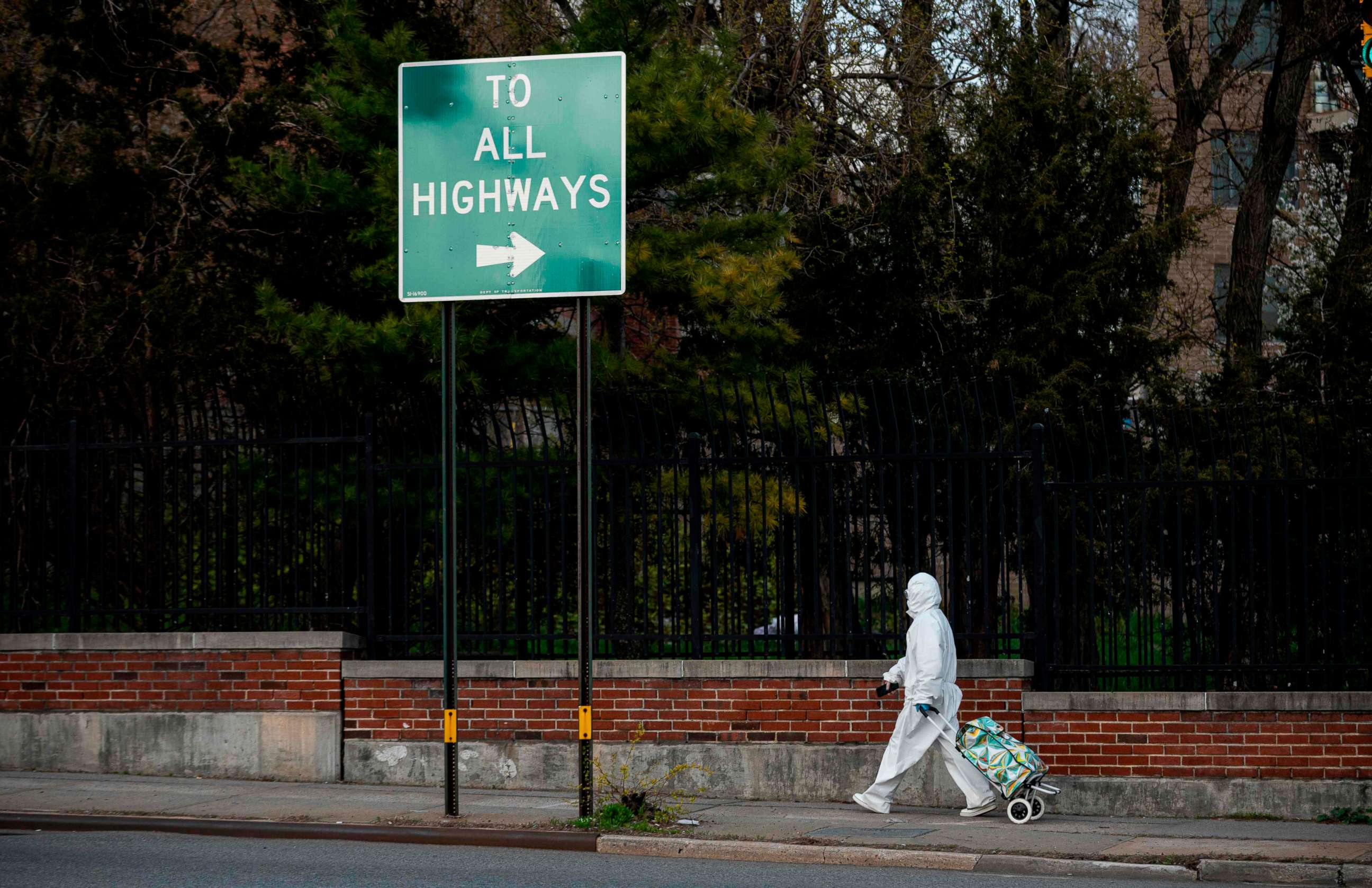
Kasai said the restrictions have proved effective and lifting them must be done gradually while continuously monitoring the situation. He said society must be prepared for a new way of living that keeps people healthy and allows economies to function while governments still work to keep the virus in check.
"As we move forward in this difficult time, our lives, our health system and approach to stopping transmission must continue to adapt and evolve along with the epidemic, at least until a vaccine or very effective treatment is found," he said. "This process will need to become our new normal."
ABC News' Matthew Claiborne, Ben Gittleson, Will Gretsky, Mina Kaji, Aaron Katersky, Rachel Katz, Alina Lobzina, Arielle Mitropoulos, Kirit Radia, Joseph Simonetti, Eric Strauss, Christine Theodorou and J Gabriel Ware contributed to this report.
